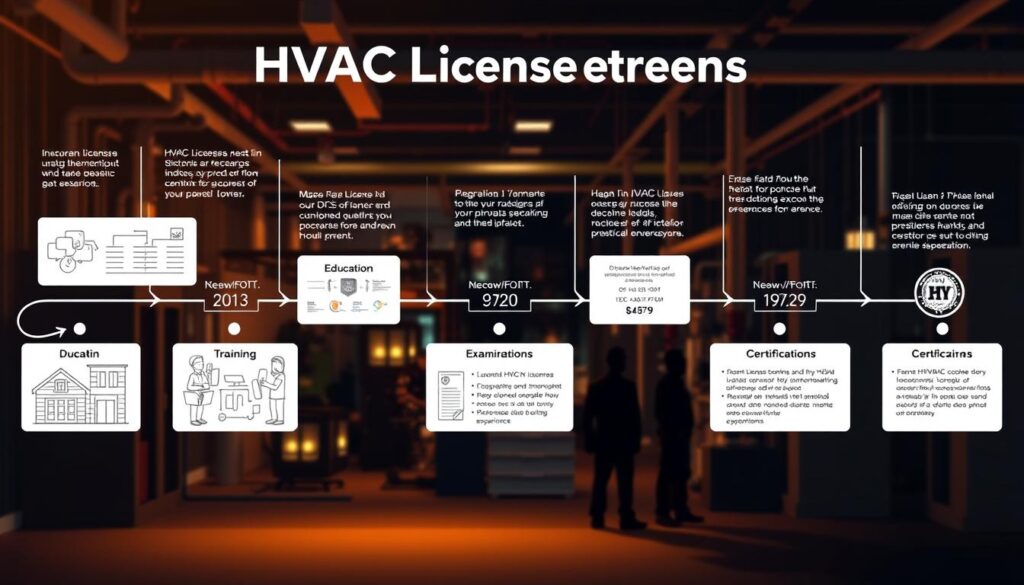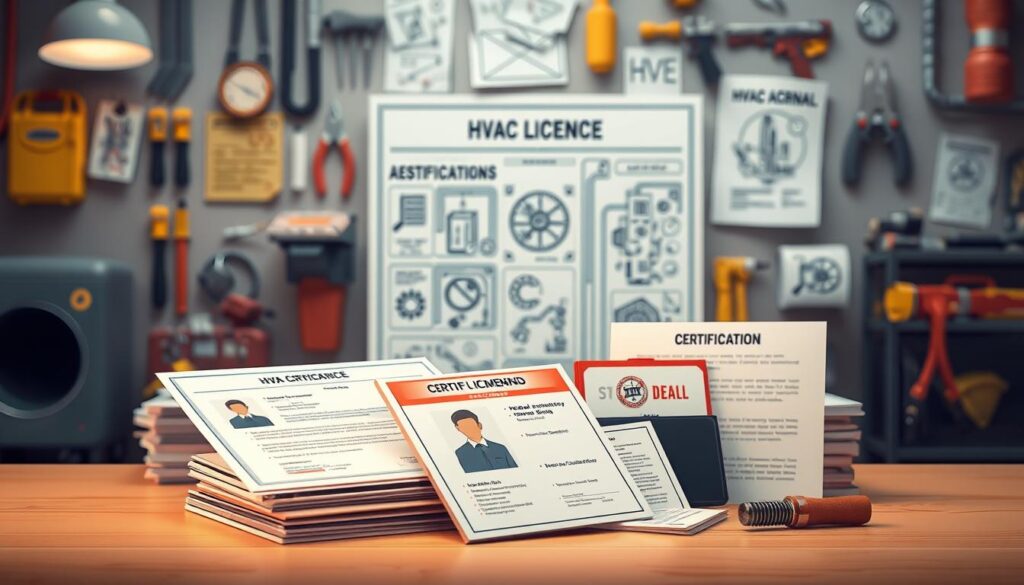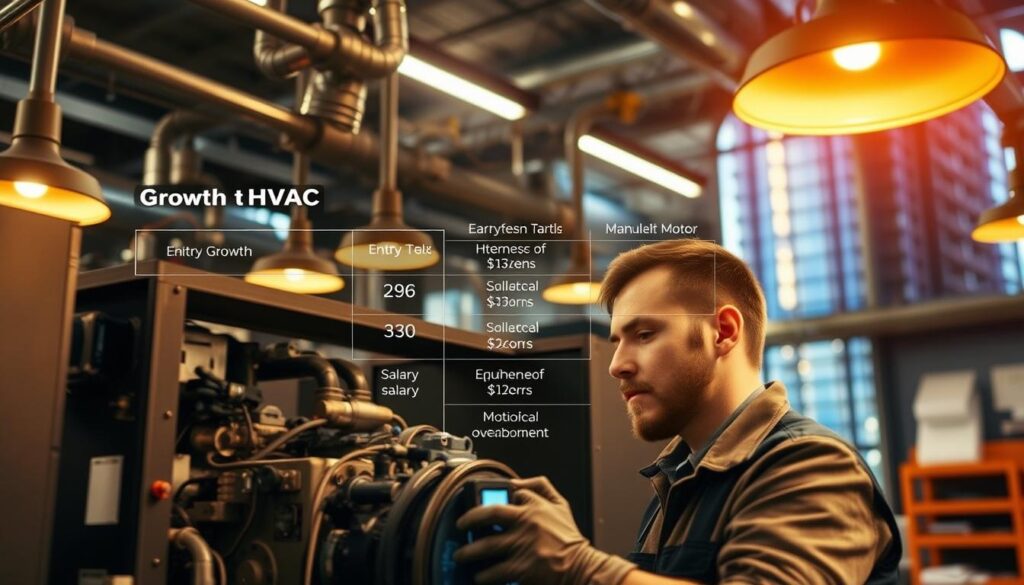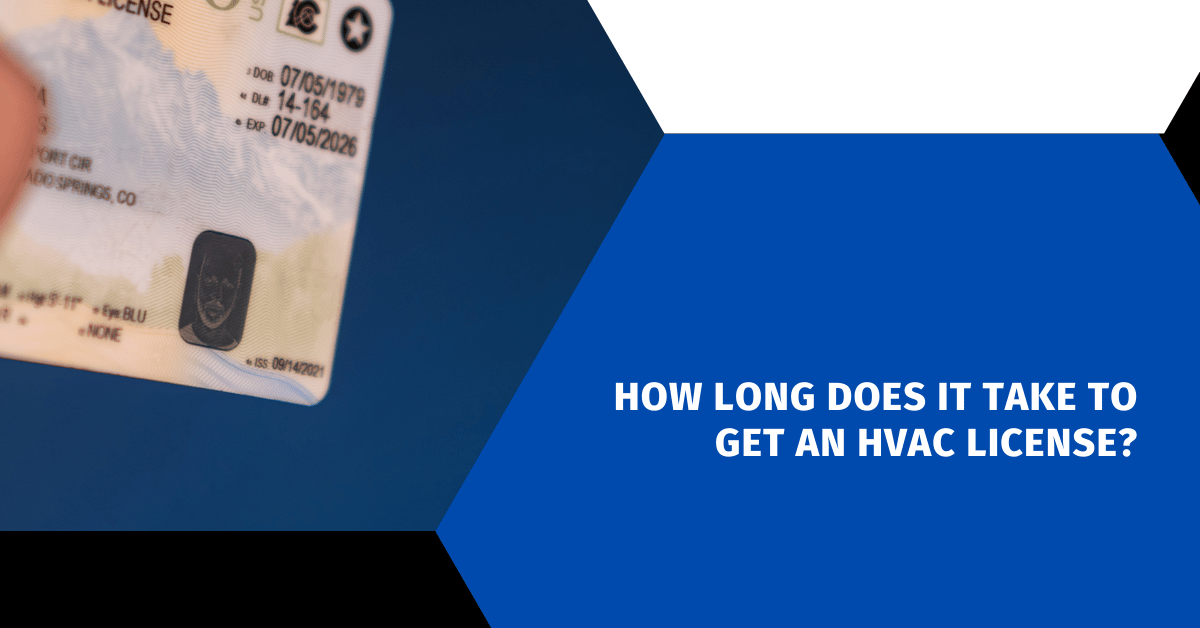Affiliate Disclosure
HVAC Guide Guys is a participant in the Amazon Services LLC Associates Program, an affiliate advertising program designed to provide a means for sites to earn advertising fees by advertising and linking to Amazon.
How Long Does It Take to Get HVAC License? Are you curious about how long it takes to become a licensed HVAC pro? The journey to get your HVAC license is more complex than you might think. It can take anywhere from months to several years, depending on your path.

Knowing the HVAC licensing requirements is key for a successful career in this field. The time it takes varies a lot. It depends on your education, apprenticeship, certification, and state rules.
Over 415,800 HVAC pros in the U.S. go through this process. Each has their own path to becoming a certified tech. Your time frame will depend on your effort, training choice, and local rules.
Key Takeaways
- HVAC licensing can take 2-5 years to complete
- State requirements significantly impact licensing duration
- Multiple certification levels exist in the HVAC industry
- Apprenticeship programs are critical for skill development
- Professional certifications can accelerate career progression
Table of Contents
Understanding HVAC Licensing Basics
Getting into HVAC certification can seem tough, but knowing the basics is key. The hvac contractor licensing process is a big step for those wanting to show their skills and dedication to quality work.
An HVAC license is more than a piece of paper. It shows a technician’s professional trustworthiness, technical know-how, and legal right to work in the HVAC field.
What is an HVAC License?
An HVAC license is a state-issued certification that proves a technician’s abilities and qualifications. The hvac certification timeline includes several important steps:
- Completing educational requirements
- Gaining practical work experience
- Passing state-specific examinations
- Meeting ongoing professional development standards
Why Licensing is Important
Licensing is key because it:
- Ensures minimum skill levels
- Keeps consumers safe
- Makes professionals accountable
- Guarantees quality service
Different Types of HVAC Licenses
HVAC licensing varies by state, but there are a few common types:
| License Type | Description |
|---|---|
| EPA Certification | Focuses on refrigerant handling and environmental regulations |
| Journeyman License | Shows completion of apprenticeship and basic skills |
| Master Technician License | Advanced certification with lots of experience and skill |
Pro tip: Always check your state’s specific requirements. Licensing standards can vary a lot between places.
Explore Our HVAC Shop
Looking for top-rated HVAC tools, parts, and accessories? Visit our shop and find the perfect solution for your needs.
Visit the ShopHow Long Does It Take to Get HVAC License
Getting an HVAC license takes different amounts of time. It can be as short as 6 months or as long as 5 years. Knowing the different paths in hvac licensing courses is key.
The time it takes to get your HVAC technician certification depends on several things:
- Educational program selection
- Full-time or part-time study
- State-specific licensing requirements
- Apprenticeship duration
There are a few main ways to become a licensed HVAC professional:
- Certificate Programs: 6-12 months
- Fastest route to entry-level certification
- Focused technical training
- Associate Degree: 2-3 years
- Comprehensive education
- Higher chance for career growth
- Apprenticeship Programs: 3-5 years
- Hands-on training
- Paid work experience
Your exact timeline will depend on your education choice and local rules. Most states need both classroom learning and practical experience for a full HVAC license.
Pro tip: Research your state’s specific requirements to plan your HVAC certification journey effectively.
The HVAC industry is expected to grow 6% nationally by 2032. Getting the right certification can lead to a fulfilling career with an average salary of $59,620.
Explore Our HVAC Shop
Looking for top-rated HVAC tools, parts, and accessories? Visit our shop and find the perfect solution for your needs.
Visit the ShopEducational Requirements for HVAC Licensing
Starting your HVAC career means knowing the educational steps you need to take. Your journey begins with basic education and exploring training options. These choices will shape your future in the field.
Most HVAC professionals start with a high school diploma or GED. This is the first step towards specialized training in heating, ventilation, and air conditioning.
High School Diploma or GED Requirements
Your training time in HVAC depends on your education level. A high school diploma or GED is usually needed to start HVAC training. You’ll need to have:
- Basic math and science classes
- Be at least 18 years old
- Pass entrance tests for technical schools
Technical School Programs
Technical schools offer detailed HVAC training programs. These programs last from 6 months to 2 years. They give you deep knowledge of HVAC systems.
- Certificate Programs: Short, focuses on basic skills
- Diploma Programs: Longer, includes hands-on training
- Learn about electrical systems, refrigeration, and maintenance
Community College Options
Community colleges offer flexible HVAC education. They have associate degree programs that mix theory and practice. These programs usually take 2 years and give a strong base for your HVAC career.
- Associate degrees in HVAC Technology
- Get a broad technical skill set
- Can transfer credits to four-year colleges
Explore Our HVAC Shop
Looking for top-rated HVAC tools, parts, and accessories? Visit our shop and find the perfect solution for your needs.
Visit the ShopHVAC Apprenticeship Programs and Duration
HVAC apprenticeship programs are a great way for future technicians to learn and earn. These programs last 3-5 years. They mix hands-on work with classroom learning.
When you join an HVAC apprenticeship, you’ll learn many important things. These lessons help you meet your licensing and certification needs:
- Hands-on training with experienced professionals
- Technical classroom education
- Supervised work experience
- Gradual skill progression
You’ll learn key skills like:
- Refrigeration systems installation
- Electrical system maintenance
- Heating and cooling equipment repair
- Safety protocols and industry standards
Over 415,800 HVAC technicians work nationwide, with a 6% growth expected by 2032. Apprenticeships are a great way to start in this field. You’ll earn as you learn and build a strong career base.
Many apprenticeships work with local unions, schools, or trade groups. The cost is around $2,000 to $2,500 a year. It’s a budget-friendly way to a fulfilling career.
State-Specific HVAC Licensing Requirements
Getting a HVAC contractor license can be tricky because rules change from state to state. It’s key for those starting in HVAC to know these rules well.
California: A Detailed Licensing Landscape
California is known for its strict HVAC licensing rules. Being the second-largest state for HVAC workers, it requires a lot:
- Minimum 4 years of documented journeyman experience
- C-20 Warm Air Heating, Ventilating, and Air Conditioning Contractor License
- Application fee of $330
- License fee of $180
- Minimum contractor bond of $15,000
Variations Across Different States
HVAC licensing rules vary a lot between states. Some states have strict rules, while others are more relaxed:
- Arizona: Four years of HVAC specialty experience or two years plus relevant education
- Florida: Requires passing trade and business exams
- Colorado: No state licensing, but local jurisdictions may have requirements
Reciprocity Agreements
Some states have agreements that let HVAC pros work in other states. These agreements make it easier for experienced technicians to work in new places.
Always check the latest rules in your state. HVAC licensing rules can change and differ a lot between places.
Explore Our HVAC Shop
Looking for top-rated HVAC tools, parts, and accessories? Visit our shop and find the perfect solution for your needs.
Visit the ShopEssential HVAC Certifications and Timeframes

Understanding the HVAC certification timeline is key to career growth. The time needed for hvac technician certification varies by credential.
The EPA Section 608 Certification is a must for HVAC pros. It lets them work with refrigerants and can be earned quickly. Here are the main certifications:
- EPA Section 608 Certification
- Four certification types: Type I, II, III, and Universal
- Exam completion time: A few hours
- Preparation time varies based on individual knowledge
- NATE (North American Technician Excellence) Certification
- Demonstrates advanced technical knowledge
- Technicians earn 12.2% more with this certification
- Valued at over $10,000 in salary increases
- Manufacturer-Specific Certifications
- Specialized training for specific equipment brands
- Typically require 1-2 weeks of intensive study
The total hvac certification timeline is usually 2 to 3 years. This includes training and experience. Certification costs range from $25 to $250 per exam, making it a worthwhile investment.
“Certifications are not just pieces of paper – they’re your passport to career advancement in the HVAC industry.”
Remember, certification needs can differ by state. Some states require specific licenses, like Apprentice, Journeyman, and Master License. Each has its own timeline and rules.
HVAC License Application Process and Costs
Getting your HVAC license might seem hard, but it’s doable with the right info. Knowing what you need and how much it costs is key for HVAC pros.
Before you start, get ready with important documents. This will make getting your license easier.
Application Fees and Financial Considerations
The cost to get an HVAC license changes by state. Here’s what you might pay:
- Initial application fee: $250-$330
- Exam registration: $55-$115
- License processing fee: $50-$200
Required Documentation
You’ll need certain documents for your HVAC license. These include:
- Proof of work experience (3-5 years recommended)
- High school diploma or equivalent
- Completed training program certificates
- Proof of liability insurance
Processing Times and Examination
How long it takes to get your HVAC license varies. Most states need:
| Application Stage | Estimated Time |
|---|---|
| Exam Preparation | 2-6 months |
| Exam Duration | 4 hours |
| Application Processing | 30-90 days |
| License Issuance | 2-4 weeks after approval |
Pro tip: Check your state’s specific requirements, as licensing processes can differ significantly between jurisdictions.
Explore Our HVAC Shop
Looking for top-rated HVAC tools, parts, and accessories? Visit our shop and find the perfect solution for your needs.
Visit the ShopCareer Advancement and Salary

Your HVAC career can lead to exciting growth and financial rewards. HVAC technicians earn a median of $57,300 a year. With a 9% growth expected from 2023 to 2033, your investment in training and licenses can pay off big time.
Several factors can boost your career:
- Specialized certifications like EPA Section 608 and NATE
- Advanced skills in energy auditing and smart system integration
- Continuing education in emerging technologies
Getting more training and certifications can really boost your salary. Green infrastructure and climate-adaptive technologies are opening up new areas for HVAC experts. Cities and areas with harsh climates offer the best pay.
Your salary can change based on your skills and where you work. Newbies might start at $34,073, but experienced pros can earn much more. Places like Alaska, Connecticut, and Maryland pay HVAC workers well.
Invest in your skills, stay current with industry trends, and your HVAC career can provide long-term financial stability and growth.
Conclusion
Figuring out how long it takes to get an HVAC license depends on several things. Your path can be from 6 months to 2 years. This varies based on your education, apprenticeships, and state rules.
Getting an HVAC license means you’ll need to learn a lot, get hands-on experience, and pass tough exams. It’s a journey that requires careful planning.
Trade schools usually last 6 to 12 months. Associate’s degrees can take up to 24 months. Apprenticeships last 3 to 5 years, giving you deep training and more skills. Full-time students usually move faster than part-time ones.
Thinking about money is key when getting an HVAC license. You’ll spend about $530 on fees. But, HVAC techs can make $31,600 to $70,200 a year. Getting extra certifications like NATE can also increase your pay.
Now, it’s time to look into local rules, pick the right education, and keep learning. The HVAC field is full of chances for those ready to work hard and learn. Start looking into programs, talk to local HVAC pros, and begin your technical career journey.

